Christian Foundation and Movement Relevancy

Building Bridges of Faith and Fellowship: Asian YMCA Christian Mission Network in Singapore
Last Updated (Wednesday, 02 April 2025 07:23)
On 16 - 18 January 2025, Metropolitan YMCA and YMCA of Singapore had the privilege of hosting the core group of the Asia YMCA Christian Mission Network (AYCMN) Conference for its meeting in Singapore. As the host, Metropolitan YMCA helped set the stage for a meaningful gathering, organising a welcome dinner while seamlessly facilitating the programme for the core group for the duration of their stay. On its final evening in Singapore, YMCA of Singapore hosted a dinner and tour of its premises for the group. Metropolitan YMCA and YMCA of Singapore are grateful for the opportunity to engage with members of the AYCMN core group and are inspired by their faithful stewardship of God’s calling of the Ys. Below are snapshots of the engagement.
1st – 3rd Day, hosted by Metropolitan YMCA
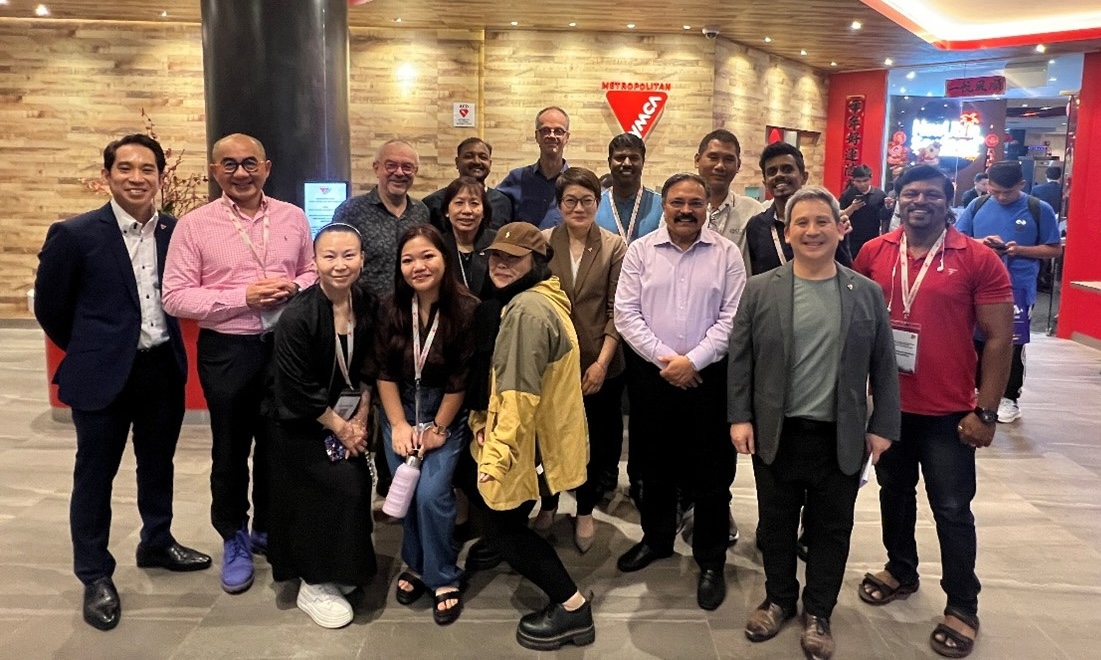
For the first three days of the Conference, delegates engaged in dynamic discussions on expanding the reach of the AYCMN - both within the host country and across the Asia-Pacific region. The sessions were not just about discussion strategy, but also about reaffirming the network’s mission, vision, and direction in today’s changing social landscape. Each morning began with a meaningful time of worship, prayer, and intercession, setting a strong spiritual foundation for the conversations that followed. Delegates explored creative ways to foster unity in Christ within the YMCA movement, embracing diverse spiritual expressions that reflect the rich faith traditions of the region. They also focused on strengthening communication channels, ensuring that member YMCAs remain well-connected, engaged, and equipped to share insights and updates that drive the mission forward.

A key highlight of the conference was the exchange of ideas on how to better equip and train the next generation of leaders to uphold Christian values and foundations in their local contexts. Discussions centred on fostering meaningful partnerships among local and Asia-Pacific YMCAs, leveraging shared experiences to build a more united and impactful Christian movement within the YMCA.
Day 3 evening hosted by the YMCA of Singapore
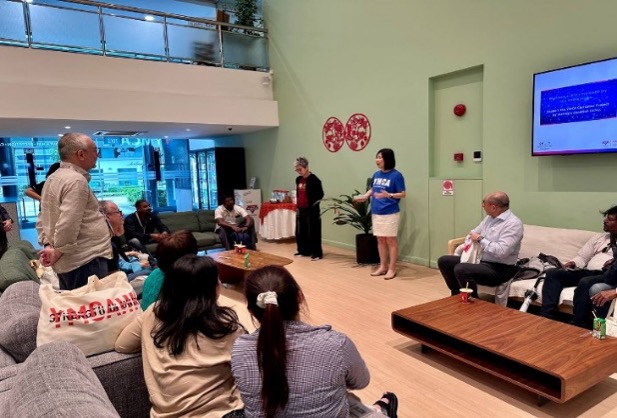
The visit commenced at 5.30 PM at the Level 1 Lobby of the YMCA of Singapore premises, where Ms Wu Mei Ling, CEO and General Secretary of YMCA of Singapore,and Ms Lynette Yeo, Asst General Secretary, warmly welcomed the guests. We then proceeded to visit the Youth Hub, where pictures of volunteers helping local communities overseas were displayed.
Ms Wu shared about YMCA of Singapore’s collaborative partnerships with other YMCAs, through its International Service Programme (ISP), and the University-YMCA (Uni-Y) initiatives.
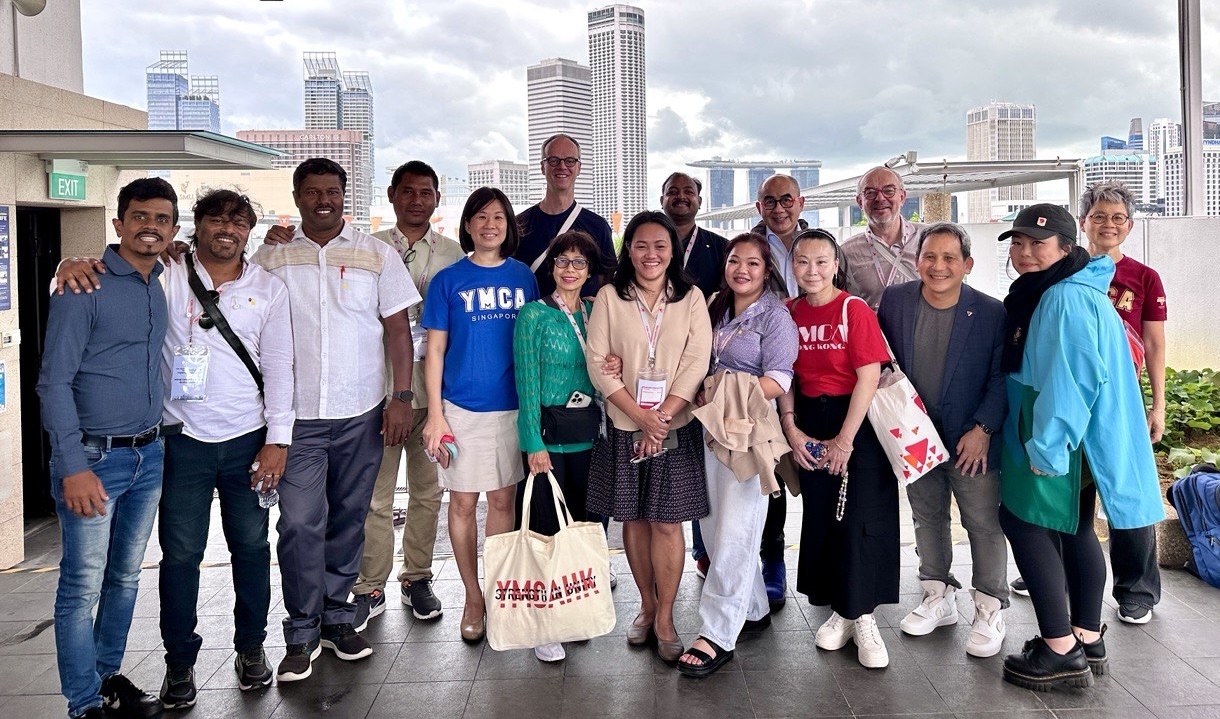
The serene ambience and breathtaking view of Singapore’s city skyline offered a perfect opportunity for the group to capture memorable moments through photographs. Group photos were taken to commemorate this memorable visit.

Warm fellowship took place in Function Room IV where Mr Vincent Ha, YMCA of Singapore Board of Director and Mr Eric Teng, President of the National Council of YMCAs of Singapore joined the group. During the fellowship session, Ms Wu, together with Amos Chua, Head of Youth Support (At-risk) and Sharon Chan, Division Head of Programmes shared on YMCA of Singapore’s Christian partnerships and YMCA’s impact initiatives, locally and internationally. Ms Wu also shared on YMCA’s aspirations to renew its One Orchard Road building.
The group then gathered round to pray for Metropolitan YMCA and YMCA of Singapore before sitting down for a communal dinner. To conclude the visit, Reverend Samuel from YMCA Salem presented a token of appreciation to YMCA of Singapore, which Mr Eric Teng, President of the National Council of YMCAs of Singapore, received on behalf of YMCA of Singapore. Ms Wu also gifted a thermal flask, representing the outpouring and sharing of God’s living waters to all who come through the doors of YMCAs.
Metropolitan YMCA and YMCA of Singapore extend heartfelt gratitude to the AYMCN for taking the time to connect and learn more about the work done by the two YMCAs in Singapore.
Contributed by:
Simeon Cheok
Senior Manager | Corporate Communications and International Relations
Metropolitan YMCA Singapore
Agnes CHAI
Senior Executive
Marketing & Corporate Communications
YMCA of Singapore
Committee on Movement Strengthening Consultation and Strategic Planning
Last Updated (Wednesday, 02 April 2025 07:23)
The Asia and Pacific Alliance of YMCAs’ Committee on Movement Strengthening conducted a Movement Strengthening Consultation on the development of MS Coordination and Strategic Planning in the Asia and Pacific region. This is in line with the efforts to develop coordination framework and system for long-term support to the movement strengthening process. The consultation was held on March 6-8, 2025, at the YMCA of Hong Kong. The consultation specifically aimed to:
- Ensure clarity of roles and responsibilities among partners specifically the Committee Members, Partner Support Group and the APAY
- Facilitate conversations and discussions on the current and future MS program direction
- Draft the MS Coordination and Strategic Plan
- Explore resource mobilization options (human and financial) for MS activities
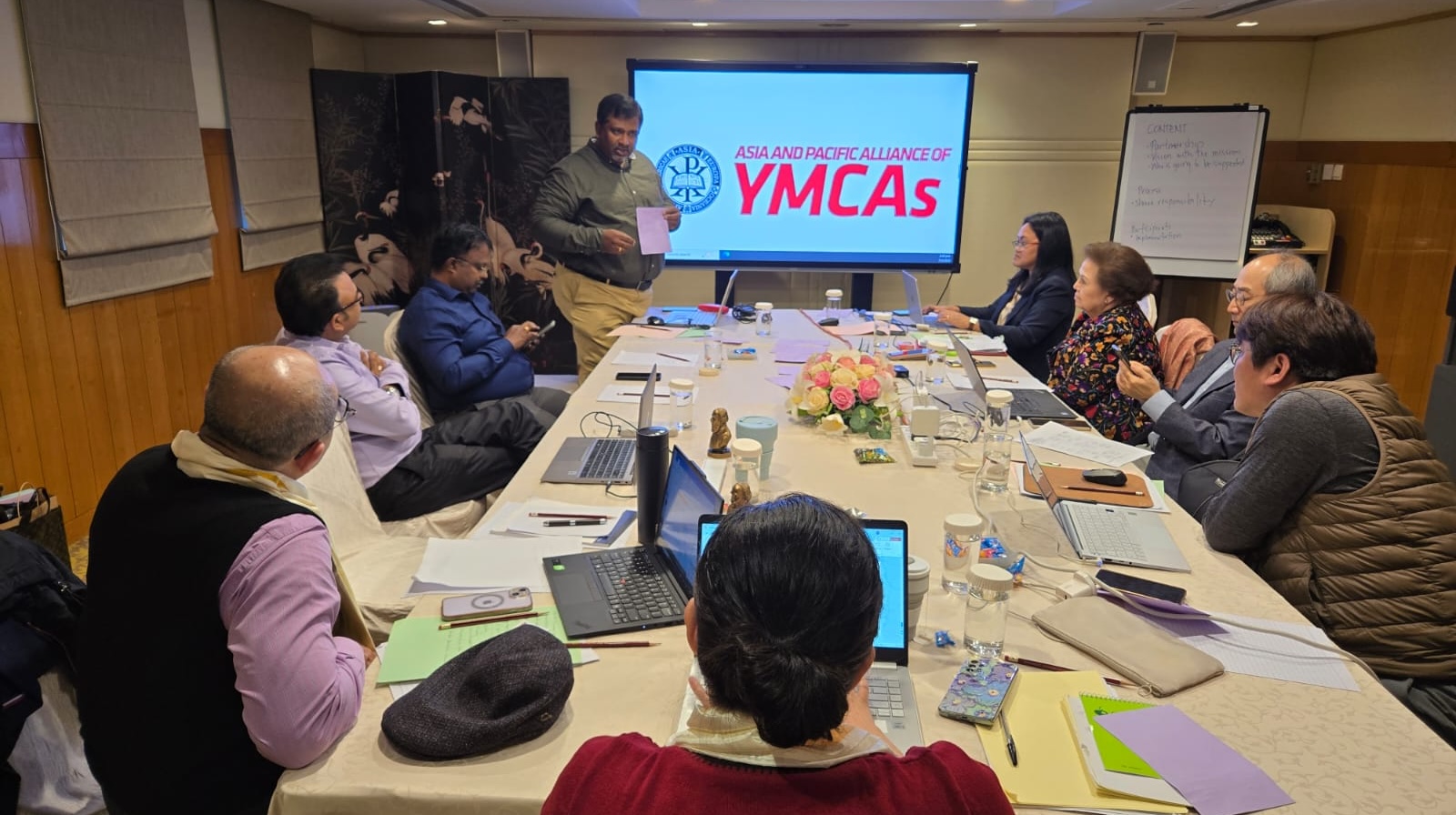
The consultation and planning were participated by the following:
- Dr. Ramona U.J. Morales, M.D., Chairperson/ Vice President APAY (SEA)
- George Vincent, Vice-Chair/ Vice President APAY (South Asia)
- Peter Ho, General Secretary, YMCA of Hong Kong, Hong Kong
- Yun Hee, General Secretary, Goyang YMCA, South Korea
- Won Young Yi (Benjamin), General Secretary, Chuncheon YMCA, South Korea
- Asir Pandian, General Secretary, Madras YMCA, Chennai, India
- Dr. Koshy Alexander, Secretary for Youth Work, National Council of YMCAs in India
- Magda Gana, (Observer) General Secretary, YMCA Makati
- Nam Boo Won, General Secretary, APAY
- Maria Cristina L. Miranda, MS Coordinator APAY
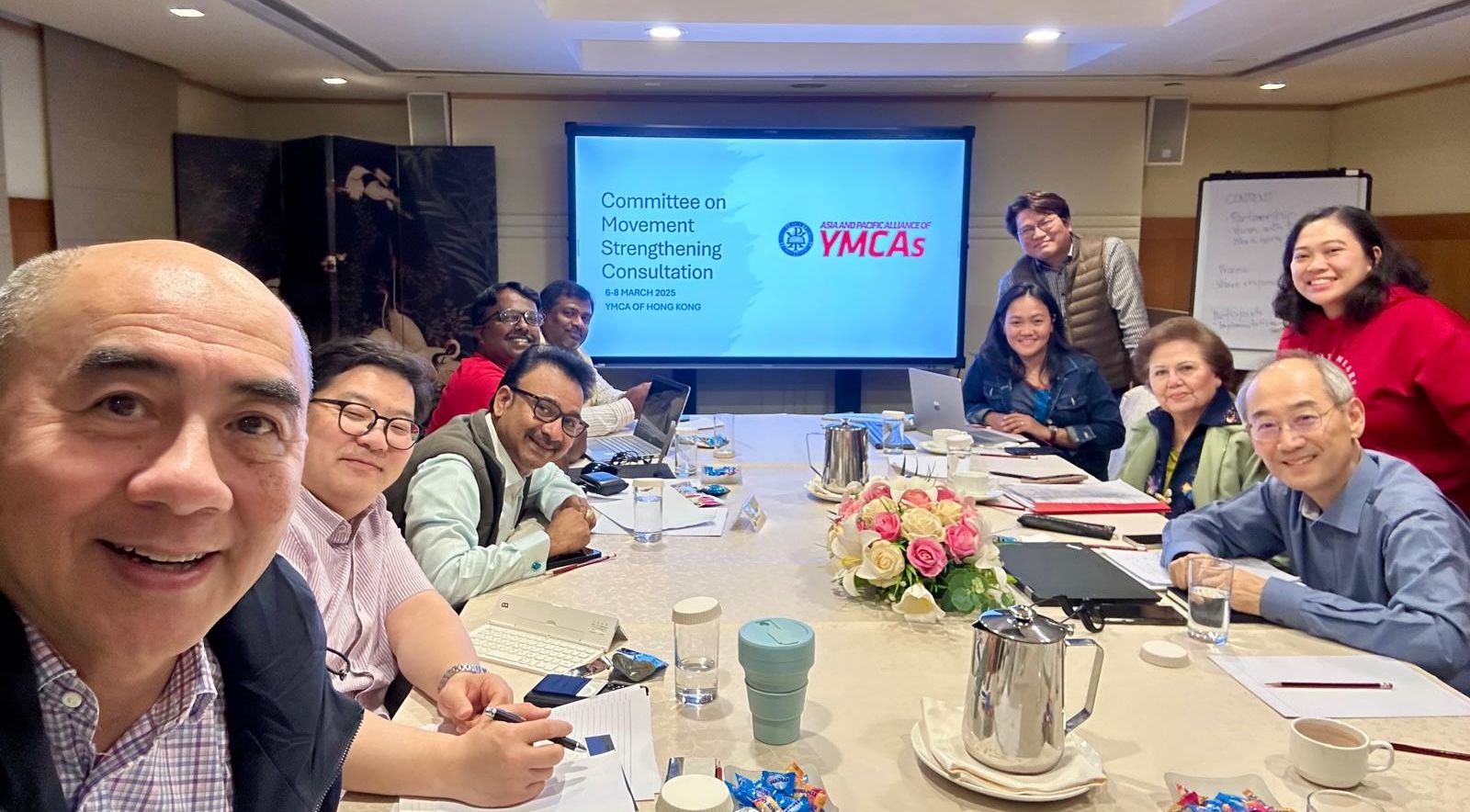
Through the participatory and consensus building approach, the members looked into the strengths, opportunities, areas that needed improvement and the threats in the movement strengthening engagement. As a result, the committee members had a comprehensive discussion on the strategic plan for the remaining quadrennial. The committee identified the activities to be prioritized and explored on how to mobilize resources to achieve the plans. The proposed activities will be reported during the Executive Committee Meeting to be held in Penang, Malaysia on April 3-7, 2025 for adoption.
The consultation also highlighted the important recognition of the coordination role of the APAY through the General Secretary and the MS Coordinator. As such, the committee affirms the role of the regional office to serve as the regional focal point that connects, and coordinates MS support coming from various stakeholders and will work directly with the target National Movements (NM). In addition, the area will provide technical advice, disseminate, and collect information and manage funds and resources. It also reaffirms the vital role of the Partner Support Group and other resource groups in proving the resources that would facilitate the progress on each of the YMCA’s in need of support.
The area will work in an intentional and continuous process to develop healthy, resilient organizations that deepen community impact and advance the YMCA Collective Mission. This is done through enhancing good governance and leadership; developing a culture of mutual and continuous learning; building financial and operational sustainability; activating youth and community voice; and building a culture of strategic innovation (Adopted from the Global YMCA MS definition, 2024).
By Maria Cristina Miranda-Lastima,
APAY MS Coordinator
Amelia Cheong Participant in the 40th Advanced Studies Program shares her reflections and Insights
Last Updated (Wednesday, 02 April 2025 07:17)
Reflection: ASP 40th Batch
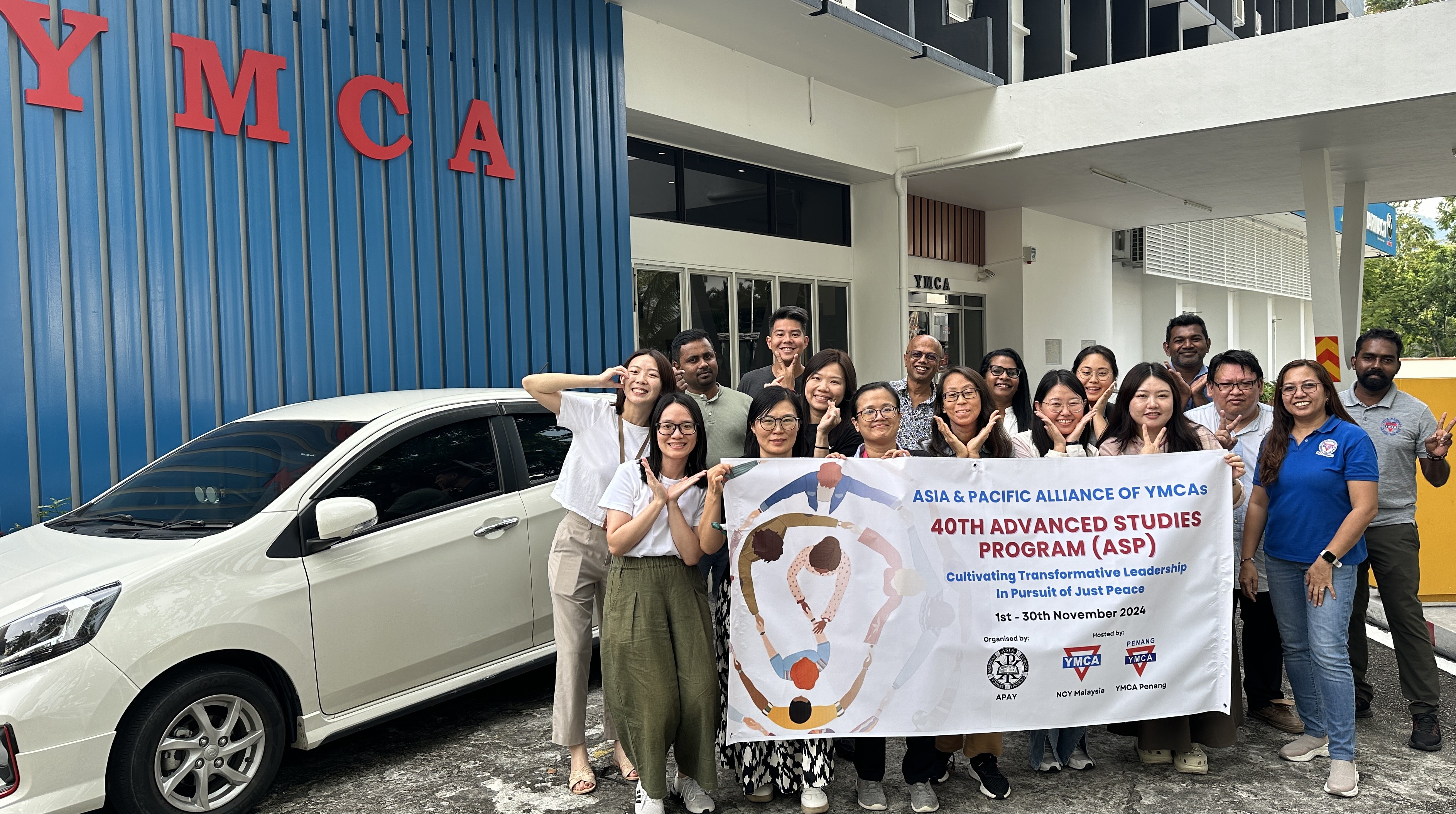
My Learning and Reflection
I have always cherished traditions and culture, especially in Malaysia, with its rich diversity. Whenever YMCA KL hosts international groups through GATN or APAY, I eagerly share Malaysia's vibrant culture and diversity through its food and traditions. Through the GATN programme, I have learned how sustainable travel can simultaneously contribute to local communities, economies, and cultures while advocating for women, children, and the environment.
Having served with YMCA KL for 9 years and 6 months by the end of 2024, I have attended over 10 training sessions and meetings from GATN, Green Ambassador to Climate Defender initiatives. I hope that through the Advanced Study Program (ASP), I can work alongside Ben and Vincent, as all three of us have participated in this program, to guide YMCA KL in realigning its current direction to better serve our communities and achieve our shared goals.
One of the most significant experiences during ASP was visiting the Orang Asli Semai Village in Gopeng, Perak, during our group’s second outing, following our visit to the Asia Community Service Centre in Penang. Although ASP was held in Penang rather than Kuala Lumpur, I felt a strong sense of responsibility to represent Malaysia and share our culture during the trip. I took the initiative to introduce participants to local food in Penang and helped with translations while ordering at drink stalls in Gopeng, where most vendors spoke Cantonese or Malay. Guiding them through these experiences and witnessing their appreciation of Malaysia’s culture gave me a profound sense of fulfilment and joy, knowing I was helping them connect with the richness of our heritage.
Upon arriving at the Orang Asli Semai Village, I was struck by its beauty, surrounded by greenery and natural stones—a stark contrast to the Aborigine villages I had visited previously. The natural grass, which I learned from Pastor Anis was native to the area, reminded me of the stark differences between rural and urban life. In Kuala Lumpur, such grass is a luxury, sold by square feet for residential compounds. This insight highlighted how Kuala Lumpur has evolved with advancing technology and urbanization, becoming a concrete city vastly different from my childhood surroundings and the natural environment of the Orang Asli village.
Despite their simple lives, the villagers prioritize education. The mothers expressed their hopes for their children to receive a better education than they had. During our evening sharing session, we emphasized the importance of preserving their cultural heritage, even as many have embraced Christianity. Unfortunately, the Malaysian government does not fully support non-Muslim aborigine communities, leaving Christian Orang Asli villages to struggle with improving their living conditions40th Advanced Study Program (1st – 30th November 2024) unless they are part of Muslim-majority communities. This disparity was disheartening but also illuminating, showing the resilience of the Orang Asli people.
The visit also reminded me of the privileges enjoyed by those of us living in the city, where we often take basic comforts for granted. Even during the trip, some participants including me found it challenging to adapt to the simple washroom facilities, despite them being equipped with basic needs.
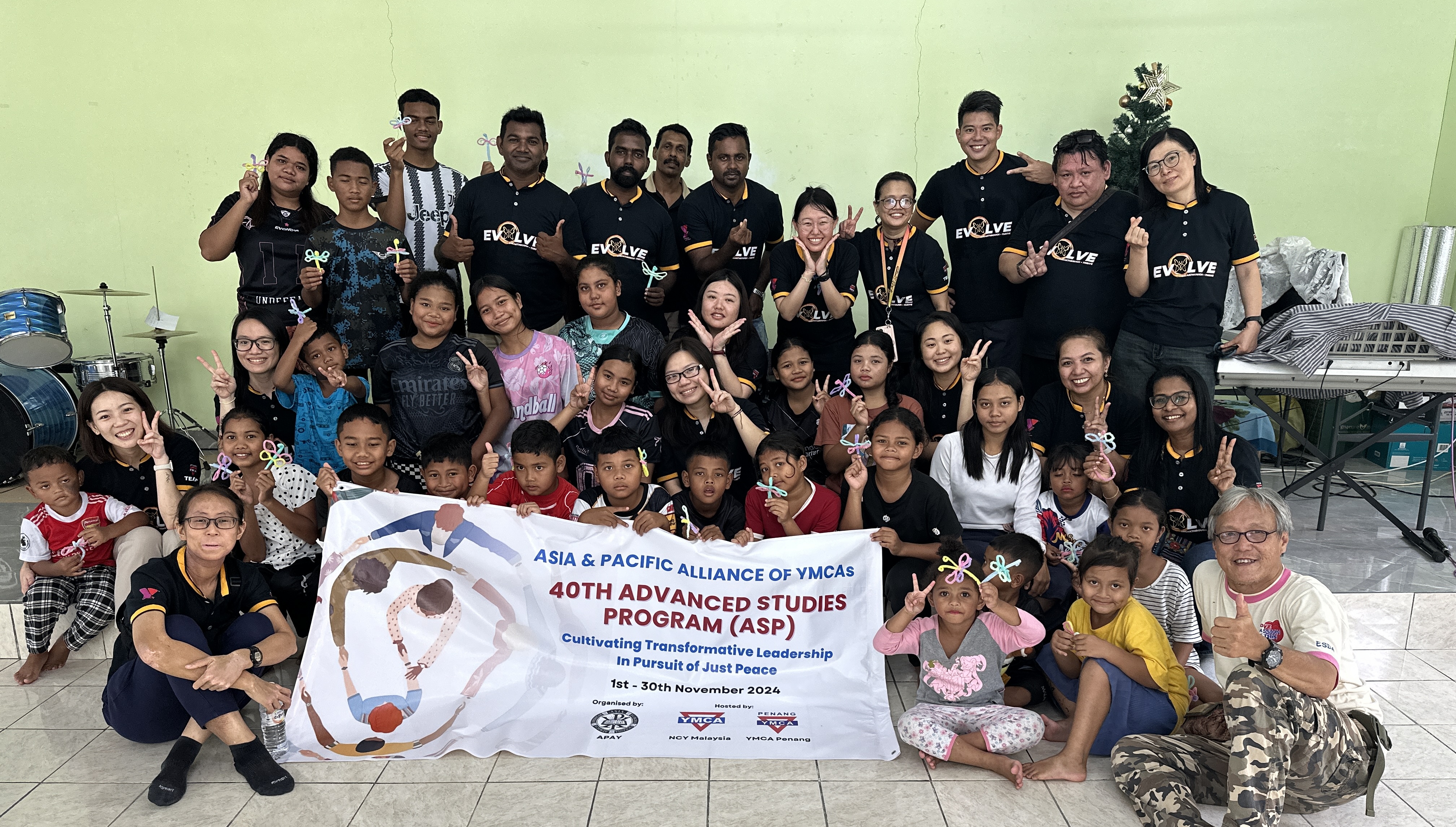
Another impactful insight came from the Asia Community Service Centre in Penang. It reminded me of the dedication of one of YMCA KL’s former staff members, who tirelessly advocated for the Deaf Community throughout her career until her retirement. She consistently created a safe and welcoming space for the Deaf Community within YMCA KL. Similarly, Ms. Aina, who oversees the Asia Community Service Centre, has established a supportive environment for individuals with mental health challenges. This space enables them to develop skills, gain independence, and integrate into society. It also reinforces YMCA KL’s commitment to community empowerment through meaningful
partnerships, such as on-site training at our hostel and GATN programmes.
Through the programmes, I developed a profound appreciation for the role of the YMCA's spiritual initiatives, such as Bible studies and interfaith dialogue sessions. These programmes provide a platform for individuals to deepen their faith while cultivating essential values like empathy and integrity. In Malaysia’s rich and diverse cultural landscape, these efforts go beyond spiritual growth they foster mutual respect and create opportunities for individuals from various faiths to connect, learn, and build understanding.
At YMCA Kuala Lumpur, our Christian Identity and Mission remain at the heart of our efforts, despite the challenges of low response to Christian-focused activities. This has not dampened our spirit. We continue to uphold Christianity’s values while remaining true to our inclusive principles. Being in a multicultural and multireligious country, YMCA KL welcomes everyone—regardless of their religion or race to be part of the YMCA family.
The YMCA’s efforts in promoting interfaith dialogue are vital in nurturing harmony and understanding within Malaysia’s diverse cultural and religious fabric. These programs create a platform for individuals to appreciate and learn from different faith traditions, fostering inclusivity and a spirit of unity.
As YMCA KL situated in Brickfields where, Buddhist Temple, Hindu Temple, Mosque and Church are located in the same row or area. Is a great opportunity to organise educational seminars and collaborations. Through the years we witness celebrations of various religious festivals around YMCA KL.40th Advanced Study Program (1st – 30th November 2024)
During the Mission in Context session, Mr. Nam’s sharing brought profound insight into the meaning of the YMCA logo. The logo not only symbolises Body, Mind, and Spirit but represents the holistic development of an individual, the local YMCA’s service to its community, and the global movement’s strengthening. Reflecting on the World YMCA’s logo and its inspiration from John 17:21, “That They All May Be One,” it became clear that YMCA operates not through the efforts of one individual but through collective action by a community.
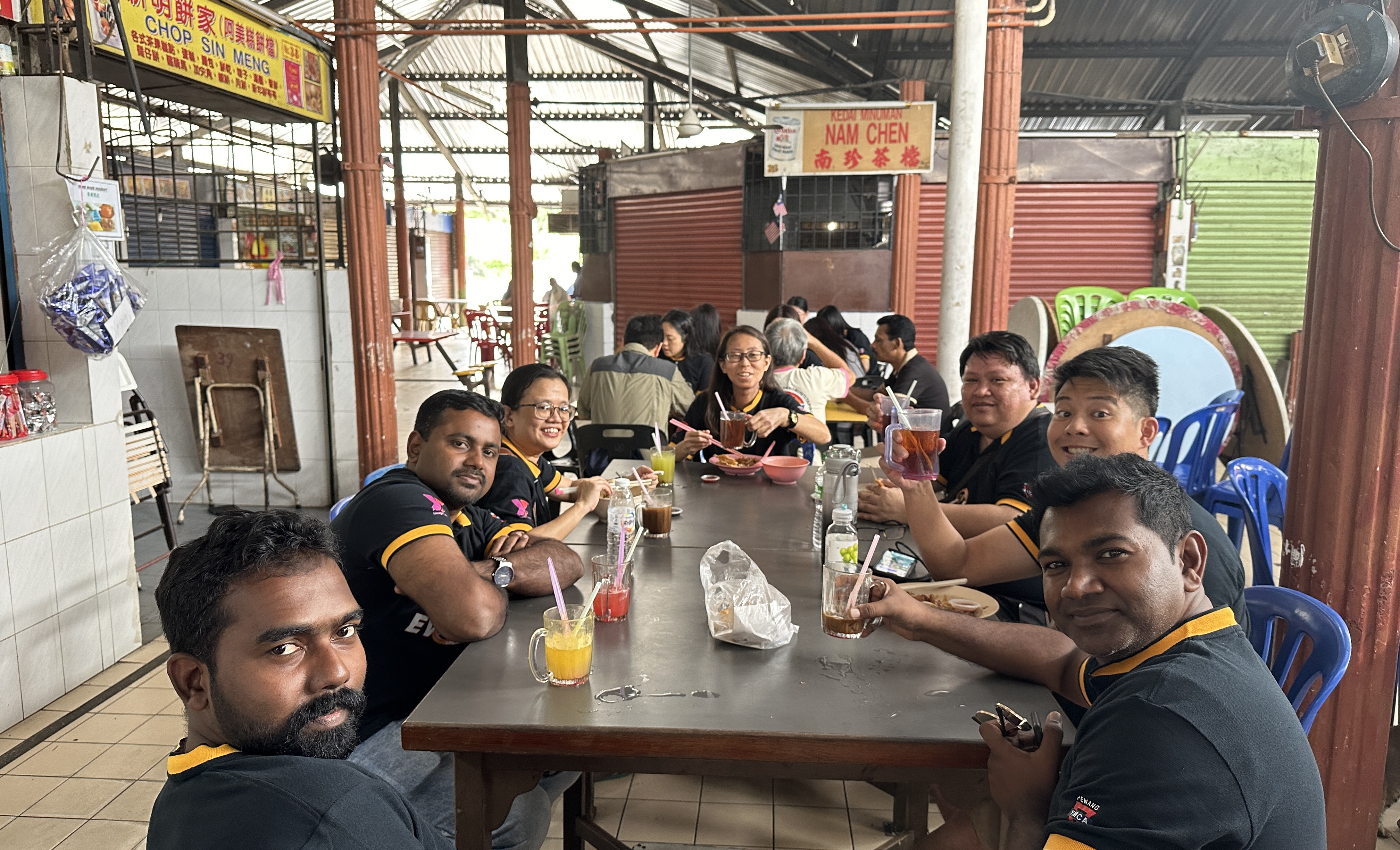
A local YMCA shapes individuals by nurturing their Body, Mind, and Spirit, and these individuals often continue to serve the YMCA as staff, members, or even board members. As a non-governmental and non-profit organization, not everyone is initially inclined to commit to working with the YMCA. However, the seeds planted by YMCA in each individual cultivate a higher likelihood of them contributing as staff, committee members, or part of its constituency.
Staff and members who have journeyed with YMCA deeply understand its mission and can design programmes that are relevant, meaningful, and centred on youth and community. In turn, these programmes enable the local YMCA to embody and communicate the broader YMCA movement effectively.
As a YMCA, we are guided by mission clarity to serve the community and create impactful transformation. This transformation ensures social relevance and reinforces the YMCA’s ability to remain operational, relevant, and impactful within its environment. When the community recognises the relevance of the YMCA movement, it becomes a reflection of its enduring capacity to inspire and sustain meaningful change.
From the sessions on Lay Professional Partnership, Good Governance, and Movement Strengthening, I found a strong connection to the current situation at YMCA KL. At present, the Heads of Departments (HODs) at YMCA KL are feeling lost and stressed due to the changes of direction away from the current vision and mission of YMCA KL. Without a General Secretary (GS) in place, decisions from the board are conveyed directly to the HODs with limited deliberation or context.
The absence of a General Secretary has created a significant gap in communication and understanding. A GS, with a deeper insight into the HODs’ challenges and working environment, could act as a bridge, discussing board decisions with the Honorary Secretary and presenting them to the HODs in a more collaborative manner. This would foster openness and mutual respect, ensuring that decisions are better received and understood.
Currently, many HODs feel dictated to carry out tasks or projects without being involved in meaningful discussions or planning. This lack of engagement has led to frustration among the HODs, which is often 40th Advanced Study Program (1st – 30th November 2024) inadvertently channelled to lay staff, creating a stressful work environment. The pressure to meet demands under these circumstances has further strained relationships, resulting in a growing sense of distrust between the HODs and the Board.
These challenges highlight the importance of strong governance structures and the critical role of a General Secretary in fostering communication, collaboration, and trust within the organisation. Addressing these issues through improved governance practices and leadership could significantly enhance the morale and effectiveness of YMCA KL’s team.
Based on the APAY’s Quadrennial Program Plan (QPP) 2024–2027, the APAY Climate Defenders project aligns with Pillar 3 of the YMCA Vision 2030 and SDG 13 (Climate Action). This project aims to empower young individuals to become champions of environmental protection and sustainability by leveraging partnerships with local organisations to raise awareness and drive actionable measures to combat climate change at the community level.
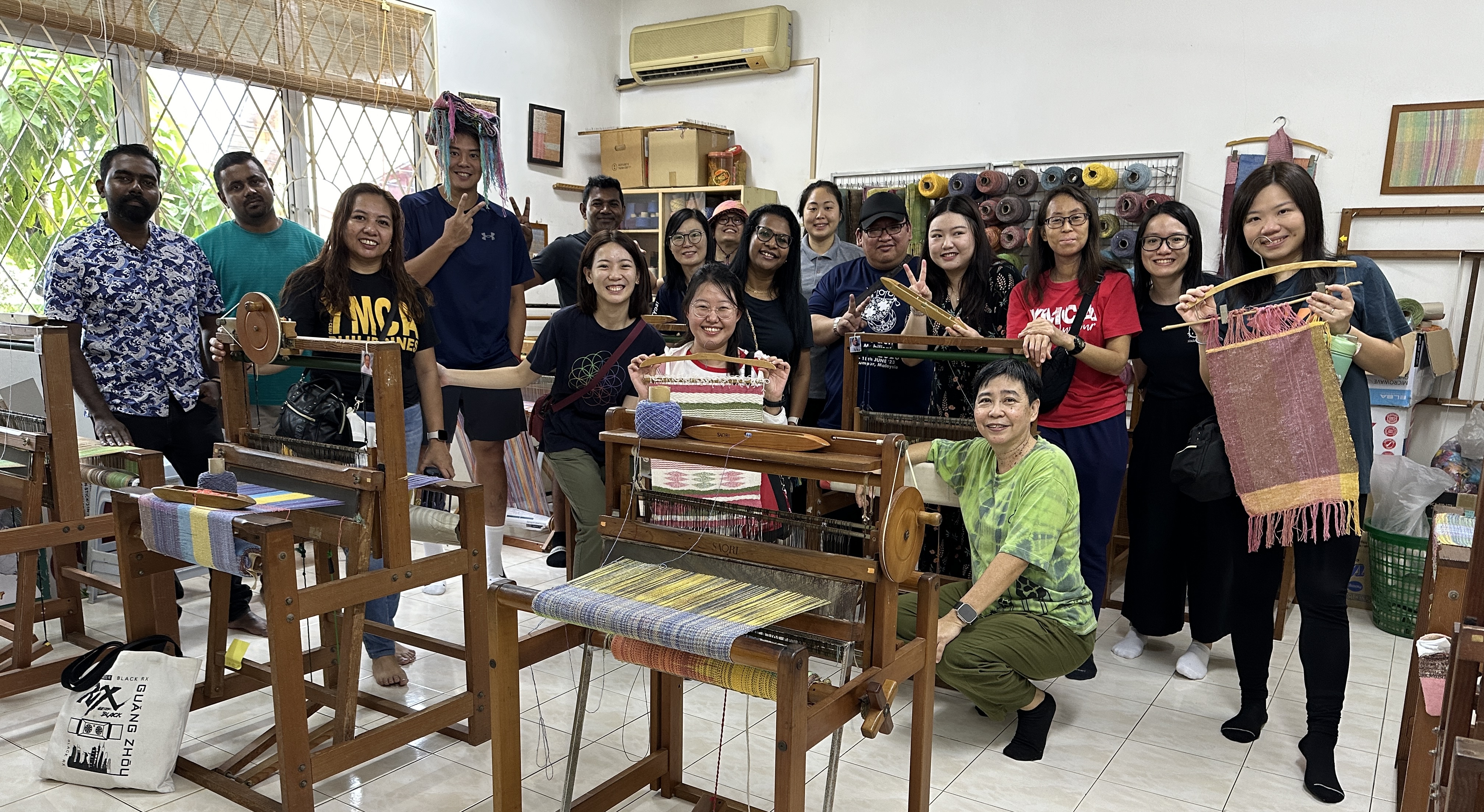
A pivotal goal of this initiative is to advance toward achieving carbon neutrality for YMCA by 2030 through the strategic implementation of diverse programmes and initiatives. In addition to empowering young individuals to combat climate change, the project will address critical areas such as climate-induced disaster risk reduction (DRR) and climate change adaptation (CCA) to build resilience.
The presentation by Mr. Chan Beng Seng on Climate Justice for a Sustainable Planet highlighted the urgency to embrace the programme plan under the Sustainable Planet pillar of the QPP. YMCA KL’s efforts in this area are particularly relevant as we own a building that is over 50 years old. This building has started to produce significant carbon emissions due to wear and tear, with some parts eroding and requiring repair. Additionally, the new building under construction will, upon completion, also contribute to carbon emissions through its operational activities.
Recognising these challenges, it is practical for internal stakeholders to begin adopting sustainable practices now to familiarise themselves and integrate these practices into daily operations. Early adoption will also ensure that once the new building is operational, YMCA KL is better equipped to minimize its carbon footprint effectively.
In line with this vision, I am committed to taking the initiative to guide my colleagues by providing internal training. I believe that for any project to be successful, it must begin internally. By embedding sustainable practices within YMCA KL’s operation—such as through our hostel, facilities, programmes, and external events—we can create a ripple effect that extends these practices to our40th Advanced Study Program (1st – 30th November 2024) members and guests. This approach ensures a holistic and impactful implementation of sustainability principles, advancing YMCA KL’s role as a leader in climate action and environmental stewardship.
During the session on Geopolitical Shifts in the Asia-Pacific Context, I gained valuable insights into how the economic power of countries like the USA, India, and China can significantly influence smaller economies. For a country like Malaysia, maintaining a balanced political relationship with major global powers—particularly the USA, China, and India—is crucial to avoiding marginalization or dominance.
These power dynamics are also evident in the global media landscape. News outlets such as CNN (USA) and BBC (UK) often filter and present news narratives that align with their respective national interests. For instance, during the session on Restoring Peace with Justice Amidst Conflict, War, and Violence, the ongoing war in Israel, Palestine, and Lebanon was discussed. The conflict between Israel and Palestine, which escalated on October 7, 2023, gained global attention largely due to the involvement of powerful states that shape its visibility and narrative.
Malaysia, being a multicultural, multiracial, and multi-religious nation, is not immune to the ripple effects of global conflicts, wars, and violence. These challenges make the country vulnerable as it seeks to balance political pressures and address advocacy efforts from its citizens.
As a peace-building organisation committed to interfaith cooperation, YMCA must adopt a neutral stance on various global conflicts—whether large or small. By promoting dialogue, understanding, and peace-building initiatives, YMCA can contribute to fostering harmony and resilience amidst the complexities of global and local political dynamics.
The Advanced Studies Program (ASP) has been an enlightening journey, deepening my understanding of YMCA’s mission and its global impact. It reinforced the importance of sustainability, interfaith dialogue, and community empowerment while emphasizing the need for effective governance and collaboration within YMCA KL.
These insights have inspired me to integrate sustainable practices, promote inclusivity, and strengthen community connections through meaningful initiatives. With renewed purpose, I am committed to contributing to YMCA KL’s mission, ensuring it continues to inspire positive change and foster unity in our diverse society.
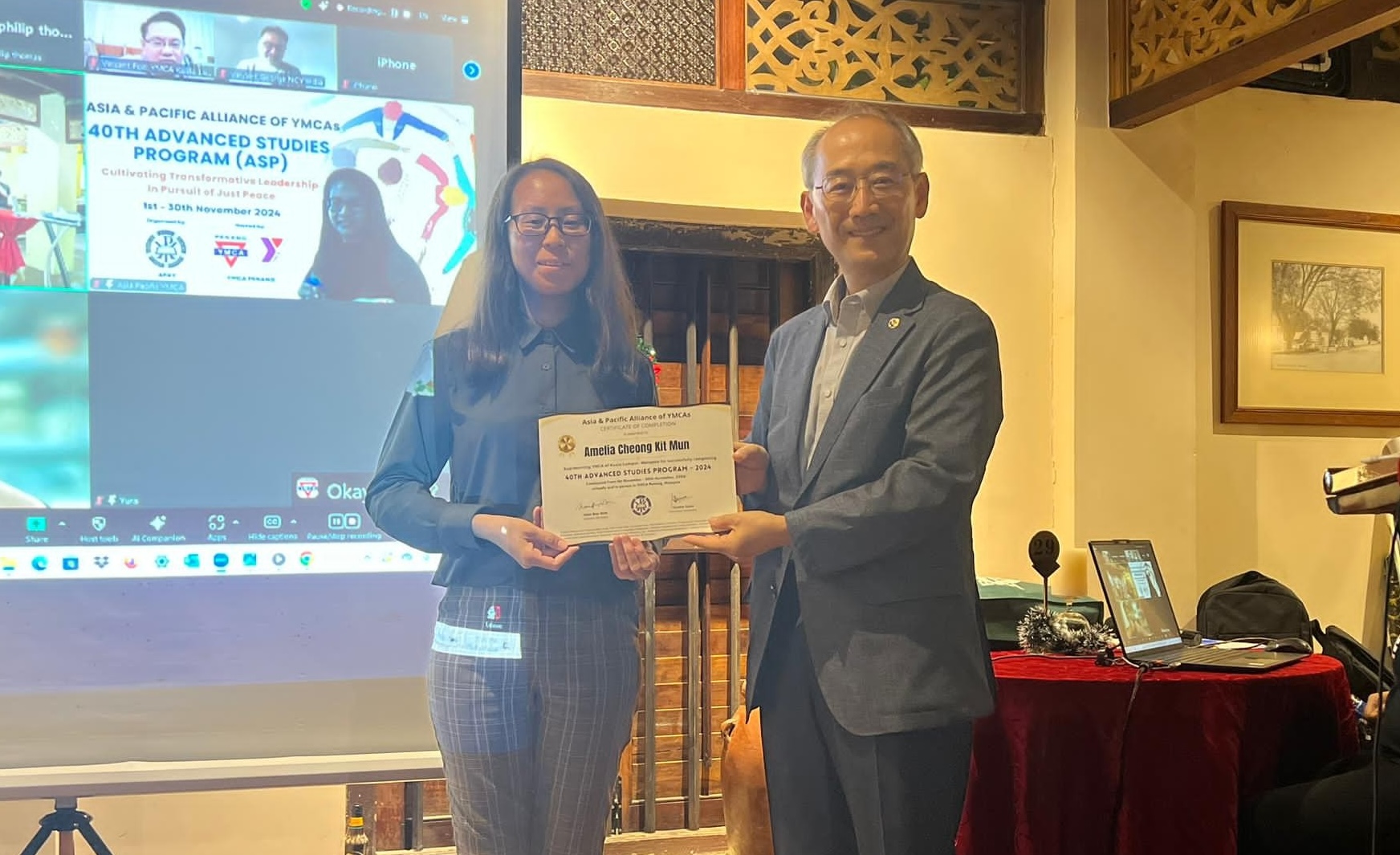
by Amelia Cheong
Peter Ho Shares Insights from the World YMCA NGS Conference in Düsseldorf, Germany
Last Updated (Friday, 07 March 2025 13:14)
YMCA Germany graciously hosted the World Alliance of YMCAs (WAY) National General Secretaries (NGS) Conference at YMCA Düsseldorf from February 16-20, 2025. NGS from YMCA Area Alliances of Africa, Asia & Pacific, Europe, Latin America & Caribbean, Middle East, and USA & Canada were represented. It was a time of greeting old friends and meeting new friends. From Asia & Pacific, we had leaders from Australia, Cambodia, Hong Kong, India, Myanmar, Philippines, South Korea and Thailand. The Chairman of YMCA Germany together with other Board members and the management team of YMCA Düsseldorf hosted a welcome dinner for the NGS. It was a humbling experience to witness their gratitude for the opportunity to receive our diverse group of YMCA leaders from around the world.

The NGS conference began with a reflection on St. Paul’s final instructions to the Thessalonians – “Prüft alles und behaltet das Gute” (1 Thessalonians 5:21) which translates to “test them all; hold on to what is good”. We were reminded not to quench the Holy Spirit, refrain from every kind of evil and to encourage one another, holding one another accountable to the mission of the YMCA. That was precisely the very reason NGS gather every year. The NGS conference is a place for peer support, a safe space to discuss our challenges, find inspiration, learn from each other and encourage each other. On the second day, YMCA Germany NGS Hansjörg Kopp (Hans) shared the “Welcome Culture in the YMCA [Germany] – A Self-Understanding” that was adopted by the General Assembly of YMCA Germany. NGS reflected on the four core values of YMCA Germany as they relate to our own YMCAs – 1) YMCA connects people, 2) YMCA actively opposes discrimination, 3) YMCA fosters a culture of inclusion, and 4) YMCA is a learning community. On the third day, NGS reflected on “The Pardon of the Sinful Woman” in Luke 7:36-50. Do we have the courage of the sinful woman to go to Jesus? Do we see what Jesus sees, or we see what Simon the Pharisee sees in the sinful woman? Simon invited Jesus to dine in his house but he did not show hospitality towards Jesus. How should we welcome Jesus and show him hospitality in the YMCA, in our YMCAs? Forgiveness is not earned. The more we acknowledge we are indebted to God and we need God’s forgiveness, the more love we can receive from God, and the more we can forgive and pass forward our love to others through our work at the YMCA.
Together NGS looked into how to transform and strengthen our YMCA Movement. We need a fresh perspective as we are living in a “crazy” world – a VUCA world of volatility, uncertainty, complexity and ambiguity that feels BANI – brittle, anxious, non-linear and incomprehensible. We need the agility of a white-water rafting crew that combines alignment and autonomy to constantly navigate a course with unexpected twists and turns, with undercurrent, bumps and obstacles. At the same time, WAY Secretary General Carlos Sanvee reminded NGS to broaden our perspective, expand our vision and learn from emperor penguins how to huddle and survive the frigid Antarctic winter temperature of minus 40 below zero by constantly shifting and rotating from the center so no one would be left permanently on the outside weathering the bitter cold and blizzards.

Visiting a local YMCA to find inspiration is always one of the highlights of my YMCA trips around the world. We visited Haus für Junge Menschen (House for Young People) of YMCA Oberhausen where a 70-year old YMCA center was renovated with six million euros into 18 modern apartments with ample community space for young people to build independent lives with the support of professional YMCA staff on site. The business world would first calculate the return on investment. Is the investment proportional to its impact? How does CVJM and CVJM House for Young People measure its impact – one young life at a time for the past 70 years and in the years to come!
NGS were randomly divided into breakout groups to share our Vision 2030 journey – our challenges and achievements. There were many encouraging moments - listening to the inspiring stories of faith, hope and perseverance from old friends in Ukraine and Belarus. It was eye opening to hear the development cooperation initiatives of YMCA Finland in youth peace work. While the NGS from Switzerland was new to her role, she was the most artistic of all in our breakout group and painted a beautiful roadmap summarizing our collective Vision 2030 journey. The YMCA of Hong Kong (YMCAHK) has set up four pillar task groups representing each of the four pillars of community wellbeing, meaningful work, sustainable planet and just world. Staff from different units of YMCAHK are represented in each pillar of their passion to incorporate elements of the pillars into their programs and service as much as possible. The overseas domestic helper program of the YMCAHK incorporates elements of all four pillars and will be celebrating its 30th anniversary this year.

Twelve of us ventured into Cologne on the last day before leaving Düsseldorf. It was a most fruitful train ride as a thought came unexpectedly that would allow me to see a possibility that I thought would not be possible before. Then suddenly I had the urge to see where we were on google map and realized that we were on the bridge crossing the Rhine River and within minutes walking distance to Cologne station. I looked out of the window, then and there, the magnificent twin spires of the Cologne Cathedral were before me. As soon as I stepped out of the train station and saw the Cathedral for the first time, I was captured by the overwhelming presence of God. Hans, thank you for organizing the excursion to the Cathedral that took 600 years to build and home of the relics of the Magi.

YMCA Germany, thank you! YMCA Düsseldorf, thank you!
God bless YMCA!
Peter Ho
General Secretary
YMCA of Hong Kong
Reflections and Insights from Wang Houyong, Participant of the 40th Advanced Studies Program
Last Updated (Wednesday, 05 March 2025 22:43)
During my participation at the 40th ASP (Advanced Studies Program) of APAY I have extensively studied and deeply thought about many fields, accumulated valuable experience, and gained profound insights. The following is my response to what I have learned and thought in this advanced training based on the learning plan objectives.
1. Cross-cultural Communication and Cooperation
Facing language barriers, I have learned to actively adapt and make full use of modern technological means. Whether in online or offline communication, I can express my views confidently and coherently.

In the program, learning, discussing, and cooperating with 15 young people from 6 different countries and regions with diverse cultural backgrounds has made me deeply appreciate the richness and challenges brought by cultural diversity. Learning to respect, understand, and integrate different ways of thinking and working methods under different cultural backgrounds is the key to achieving efficient cooperation. For example, in team discussions, members from different countries may have completely different views and solutions to the same problem. Through active listening and communication, we can learn from each other's strengths and jointly find more innovative and feasible solutions.
Under the framework of the APAY, YMCA of various countries actively carry out community service activities through their organizations. From the introductions of each YMCA, we found that many service objects have similarities, which indicates that there may be opportunities for exchanges and cooperation in the future, such as the donation of children's toys and youth summer camps. During the sharing of life journeys, we realized that everyone is enthusiastically engaged in the work of the YMCA, which further motivates me to work wholeheartedly and influence lives with my own life. The situational Bible study course has benefited me a lot. It turns out that the origin of many knowledge contents can be traced back to the Bible. In Chinese, in the past perception, I only knew "what it is but not why it is so". In addition, in the worship session, I used to think that it was only a traditional church worship mode, but this learning has given me a completely new understanding. What makes me even more honored is that I led the worship together with like-minded Christian faith colleagues and shared Gibran's "On Children", which resonated deeply with everyone.

2. Improvement of Project Management and Organizational Ability
Participating in the planning, implementation, and evaluation process of various project activities has given me a clearer understanding of the entire process of project management. From setting project goals, to task decomposition, time planning, resource allocation, and risk control, every step requires careful planning and coordination. At the same time, learn to flexibly adjust strategies according to the actual situation to ensure that the project can be smoothly advanced and achieve the expected results. When organizing community activities, in the face of unexpected situations such as venue changes and personnel changes, I can quickly respond and re-plan the activity process to ensure the smooth progress of the activity, which has greatly exercised my adaptability and organizational coordination ability.
Two field visit experiences
A. EXPOSURE & Visit
The community service project for the disabled is very impressive. Their innovative thinking and unique service concept are really worthy of our in-depth consideration and reference. For example, referring to the service objects as "members" instead of "students", this detail shows their respect and attention to individuals. This makes me think about how to improve the more than 200 similar institutions in Shanghai. During this visit, the orderly leadership of the core team has taught me a lot. Due to special changes on that day, their ability to adapt to the situation is very worthy of learning for me as a project supervisor.

1. Indigenous Community Visit
This visit has benefited me a lot in terms of detail handling. In previous activities, I often entrusted many preparatory tasks to the core leaders. However, this experience has made me deeply realize how important it is to clarify everyone's responsibilities, detail the handling of each link, and formulate emergency plans in advance (such as measures in case of time constraints).
After arriving on that day, the actual arrangement was completely different from the previous assumption, but the project team adapted to the situation and everything went smoothly. The children played heartily in the games and were all fully concentrated. What is particularly unforgettable is the youngest child. At first, he shyly avoided our gaze and played with a small car alone. However, that was just his way of observing us. First, the older brothers and sisters interacted with us, and he began to slowly integrate. Especially after Ian's encouragement, he was already able to help, and finally he would play the shooting game quietly and knock on us from behind. In our daily services, we will also encounter similar situations, and this visit has given me a lot of valuable experience.

In addition, I also participated in the learning and evaluation of the entire senior officer training. During this process, I played multiple roles, including moderator, workshop facilitator, mid-term and final evaluator, and document compilation and writing group member. Through the whole participation, I not only exercised my ability and sense of responsibility, but also deeply felt a respectful and inclusive environment, which injected great energy into me. In future project design, we should also fully consider the role design of different participants so that the participants can act as the leaders of the entire project and jointly promote the progress of the project.

2. Ability to Analyze and Solve Social Problems
Through the research and analysis of the needs of the community and youth groups, I have learned to use a variety of methods to deeply explore the deep-seated reasons behind the problems and try to propose targeted solutions. I closely follow social hot issues such as youth movements, community development, and environmental protection, and conduct in-depth analysis from both the macro social environment and the micro individual needs, and formulate effective action plans accordingly. For example, in response to the employment problem of community youth, we should not only consider the supply and demand relationship in the job market, but also pay attention to the career planning and skill improvement needs of the youth themselves, so as to carry out a series of activities such as vocational training and entrepreneurship support.
In the learning of this section, several themes revolve around the geopolitics of the Asia-Pacific region and the Middle East in the context of the Bible. The resource persons shared based on their own research under a neutral value background. During the discussion, due to the differences in the political backgrounds of different countries and regions, some discussions were triggered. Here, it has aroused a little thought of mine: the earth is like a big family, and the growth of members affects each other. Only by respecting each other can we build harmony together; once a member encounters difficulties, it will also affect others. Finally, we need to pay attention to the theme of fairness and justice. In addition, regarding the theme of gender equality, ten or even twenty years ago, in the process of urbanization in China, especially in rural areas, the problem of gender inequality was relatively serious (only based on personal observation and understanding). But now, the situation is not as serious as in other regions shared by the resource persons. However, this also highlights the importance of continuous attention to the issue of gender equality. The All-China Women's Federation and youth organizations actively take measures to protect the legitimate rights and interests of women and promote gender equality in accordance with laws and policies such as the Law of the People's Republic of China on the Protection of Women's Rights and Interests.

In the past, I mostly played a front-line role, and many services, although related to the theme, were not effectively connected and lacked comprehensive consideration from a larger perspective. Through this learning, I can reflect on our services from a higher perspective and respond to the five thematic pillars of QPP in the implementation of services. At the same time, we will implement specific service projects in combination with the social, political, economic, and cultural backgrounds.
3. Leadership and Team Building
In the project training, having the opportunity to play different roles and assume corresponding responsibilities has given me a deeper understanding of leadership. Leadership is not only about commanding and making decisions, but more importantly, it is about motivating team members and giving play to everyone's strengths to work together to achieve goals. Strengthen team building, create a positive, trusting, and helpful team culture, and further enhance the cohesion and combat effectiveness of the team through efficient communication and cooperation. When leading the team, I deeply understand the expertise and needs of each member, scientifically assign tasks, and encourage members to actively participate in discussion and decision-making, so that each member can feel self-worth and a sense of belonging, and then wholeheartedly devote themselves to the project and contribute their strength. I have learned the most from Sunita in this regard, and also from other participants.

In addition, in the learning of this section, I have deeply understood the essence of themes such as youth empowerment, meaningful work, YMCA youth participation, and creative workshops, and have gained a lot. According to SDG, Challenge 21, and QPP, integrate youth services into specific services. There are many projects in the past work of the APAY that respond to the five themes. Mr. Michael Cheong passionately shared how to mobilize young people to participate in the service projects of YMCA. The creative workshop allowed us to fully engage in it, and this way is very suitable for motivating young people to participate. At the same time, the content related to personal mind and body can also relieve the pressure of young parents in the community and can be well integrated into the work in the future.
Through the curriculum plan arrangement, different colleagues assume different role tasks, which gives us the opportunity to participate. After seeing the hosting and leading experience of other colleagues, I found that my ability has been greatly improved, especially the experience of being a moderator, which has given me great encouragement. Although the pressure was great during the preparation process, I cherish this platform to show myself very much. Thanks to the encouragement of my little friends, I am very grateful.
4. Deepening the Concept of Sustainable Development
I have a deeper understanding of the concept of sustainable development and integrated it into project planning and implementation. I realize that in the process of promoting community development and serving youth groups, we should take into account the sustainability of the economy, society, and environment. Advocate environmental protection activities, promote green lifestyles, and at the same time focus on cultivating the social responsibility and sustainable development awareness of young people, so that they can become the active promoters of sustainable development in future society. For example, when organizing community activities, we should give priority to using environmentally friendly materials, reduce the use of disposable products, and encourage young people to participate in waste classification and environmental protection publicity activities, starting from the little things and contributing to environmental protection.
The learning of this section has a profound impact on me. Among them, the theme of "Sustainable Planet" has inspired me a lot. In the next two years, I plan to integrate the concept of sustainable development into the groups of college students, high school students, and primary school students I serve. Especially for the part of white pollution, since the implementation of waste classification in Shanghai in July 2019, after five years of development, the awareness of environmental protection has been deeply rooted in people's hearts. However, on the road to white pollution control, we still need to continue to work hard and strive to do better. When I heard the introduction of "boomerang" by the resource person, this idea began to take shape in my mind. After receiving a large amount of content, I am gradually sorting out and refining the plan, and I firmly believe that it will be put into practice in the future.
In conclusion, in response to the theme of this project training, transformational leadership is reflected in understanding and respecting cultural differences, establishing a common vision, and promoting communication and cooperation; in terms of project management and organizational ability improvement, it is elaborated from motivating the team to pursue excellence, cultivating the abilities of team members, and establishing an effective organizational structure; for the ability to analyze and solve social problems, it includes leading social change, stimulating innovative thinking, and establishing cooperative partnerships; in leadership and team building, it includes leading by example, inspiring and motivating, and cultivating team spirit; in deepening the concept of sustainable development, it is from promoting sustainable development strategies, cultivating sustainable development awareness, and leading the sustainable development of the industry.

Finally, I suggest that, especially for participants with weak English foundations, it would be very beneficial if materials could be distributed in advance. For example, for the situational Bible study part of universalism and the universal movement, I had difficulty understanding it when I first read it because I was not familiar with the Bible. Later, I sorted out the relationship by referring to the Bible and making a mind map, and the effect was remarkable when I read it again. Coupled with the explanation of the resource person, this is the clearest learning for me. Also, if possible, the learning outline could be given to everyone when applying. It doesn't need to be in a very detailed form. I think it would be better if we could preview and practice English in advance.
Wang Houyong
Assistant Director/ Social Worker
YMCA of Shanghai, China
Participant of the 40th ASP
Read more...
Page 6 of 27





